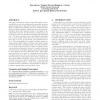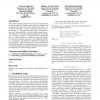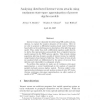341 search results - page 49 / 69 » Trust Representation and Aggregation in a Distributed Agent ... |
117
click to vote
ATAL
2009
Springer
15 years 8 months ago
2009
Springer
This paper considers the design of agent strategies for deciding whether to help other members of a group with whom an agent is engaged in a collaborative activity. Three characte...
101
click to vote
ATAL
2008
Springer
15 years 3 months ago
2008
Springer
Some natural epistemic properties which may arise in applications can only be expressed in standard epistemic logic by formulae which are exponentially long in the number of agent...
119
click to vote
ATAL
2008
Springer
15 years 3 months ago
2008
Springer
Two currently active strands of research on logics for multi-agent systems are dynamic epistemic logic, focusing on the epistemic consequences of actions, and logics of coalitiona...
125
click to vote
JCSS
2008
15 years 1 months ago
2008
Internet worms are classically described using SIR models and simulations, to capture the massive dynamics of the system. Here we are able to generate a differential equation-base...
145
click to vote
IPPS
2002
IEEE
15 years 6 months ago
2002
IEEE
Future scalable, high throughput, and high performance applications are likely to execute on platforms constructed by clustering multiple autonomous distributed servers, with reso...



